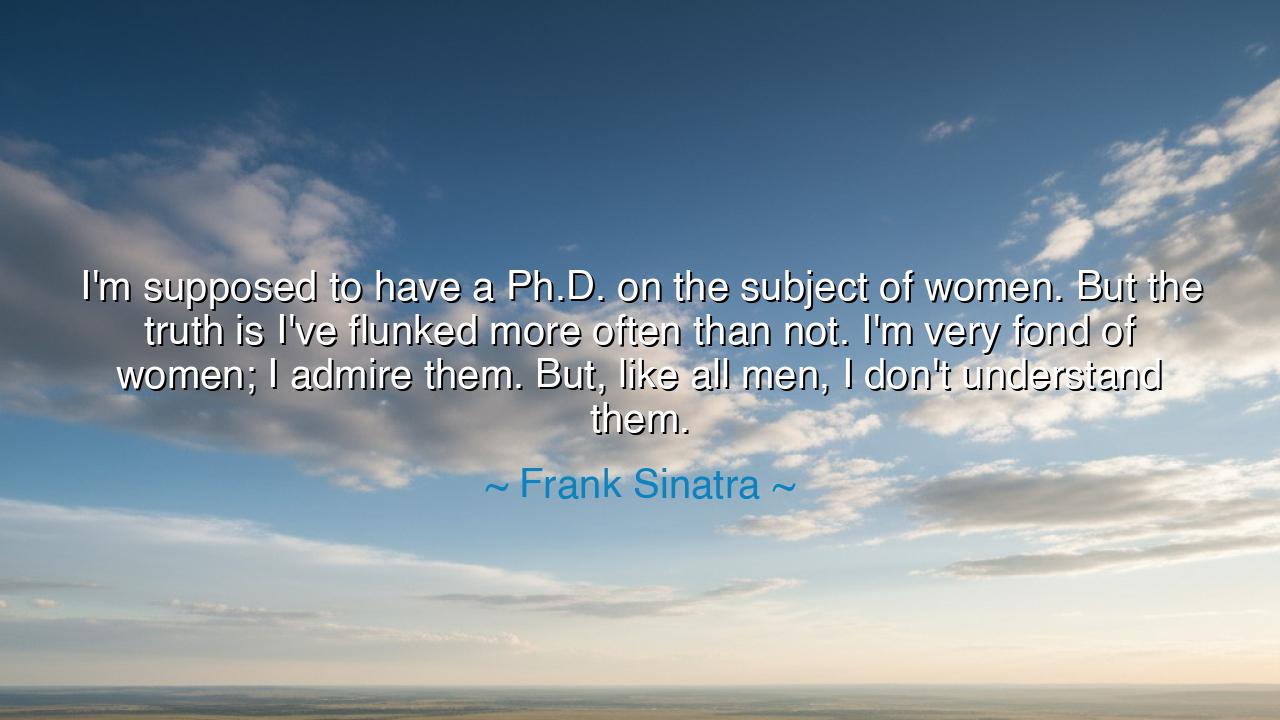
I'm supposed to have a Ph.D. on the subject of women. But the
I'm supposed to have a Ph.D. on the subject of women. But the truth is I've flunked more often than not. I'm very fond of women; I admire them. But, like all men, I don't understand them.






The words of Frank Sinatra—“I’m supposed to have a Ph.D. on the subject of women. But the truth is I’ve flunked more often than not. I’m very fond of women; I admire them. But, like all men, I don’t understand them.”—reveal a confession clothed in both humor and humility. Here the great singer, admired for his charm and adored by countless admirers, lays bare a universal truth: that the mystery of women, and indeed of love itself, is not something easily mastered, even by those who have lived among it with intensity and passion. He speaks as one who has tasted much of life, yet admits that in this realm he remains a perpetual student.
The origin of such words springs from the long story of Sinatra’s own life, marked by romances that were as celebrated as his music. Married multiple times, entangled in passions both joyous and stormy, he knew firsthand the soaring heights and crashing depths of relationships. His truth was not the triumph of mastery, but the acknowledgment of mystery. In this way, he stands in line with the ancients, who often declared that love was not a science but a divine madness. For how can one chart with reason the depths of the human heart?
History, too, offers its witnesses. Consider the tale of Antony and Cleopatra. Antony, warrior of Rome, thought himself strong enough to command legions and kingdoms, yet in the presence of Cleopatra, he was undone. His strategies faltered, his judgment swayed, for love had made him both greater and weaker. Like Sinatra’s confession, their story reveals that even the most powerful men stumble when confronted with the profound, unfathomable mystery of woman and of love. To “flunk” in this subject is not failure alone—it is part of being human.
And yet, Sinatra tempers his admission with reverence: “I’m very fond of women; I admire them.” In these words lies a crucial balance. Though he confesses ignorance, he does not cloak it in bitterness or disdain. Instead, he lifts women up as beings to be cherished, admired, and loved—even when not fully understood. This humility, mingled with admiration, is a rare wisdom: for to recognize the limits of one’s knowledge while still honoring the beauty of what is unknown is a mark of true respect.
The lesson we may draw is that in relationships, the goal is not perfect comprehension but deep appreciation. To demand total understanding of another is to make love into a mechanical science; but to accept mystery while practicing kindness, patience, and reverence is to allow love to breathe. The truth of human connection lies not in mastery but in presence—showing up with openness, even when certainty escapes us.
So let this teaching guide us: men and women, alike, need not strive to dominate the riddle of one another’s hearts. Instead, let them walk in admiration, in curiosity, in gentle humility. The mystery itself is part of the wonder. To seek to “solve” the other is to lose them; to seek to honor them is to grow together in love. In this way, Sinatra’s humorous confession becomes a beacon of wisdom: to admit that you do not fully understand is not weakness, but honesty.
Therefore, take these actions: honor those you love, not with the arrogance of mastery, but with the reverence of a learner. Ask questions, but accept that some mysteries cannot be solved. Cherish the differences that puzzle you, for they may be the very things that draw you closer. And when you stumble in love, as Sinatra did, do not despair—learn, laugh, and continue to admire. For the truth is that the heart was never meant to be conquered like a kingdom, but nurtured like a flame, fragile and wondrous, illuminating the path of all who dare to love.






HLNguyen Hoang Linh
Sinatra’s playful remark about not understanding women despite being fond of them is an interesting commentary on how men often struggle to connect with women on a deeper level. His acknowledgment is relatable—sometimes, no matter how much we care for someone, we fail to fully grasp their perspective. But what does it mean to 'understand' someone? Is it truly about perfect comprehension, or about accepting and valuing differences?
NHNgoc Huyen
Sinatra’s quote makes me think about how gender dynamics often leave people feeling misunderstood. It’s refreshing to hear someone acknowledge the complexity of the opposite sex, but I wonder, is understanding women really something that can be 'flunked'? Maybe it's not about a perfect understanding, but about empathy, communication, and accepting that we won’t always have all the answers. Does that make for better relationships?
THNguyen Thanh Huong
This quote from Sinatra speaks to the common struggle of understanding people who are different from us, especially when it comes to relationships between men and women. His humility in admitting he doesn’t understand women, despite his admiration, is refreshing. Does this mean that understanding women is unattainable, or is it about finding common ground and respecting differences rather than truly 'understanding' each other?
HAHuynh Anh
Frank Sinatra's quote is both humorous and relatable. It highlights the complexity of understanding others, especially when it comes to gender. He seems to acknowledge that no matter how much we may admire or care for someone, truly understanding them is a challenge. Is it possible to ever fully understand another person, or do we simply need to appreciate the mystery and differences that exist between us?